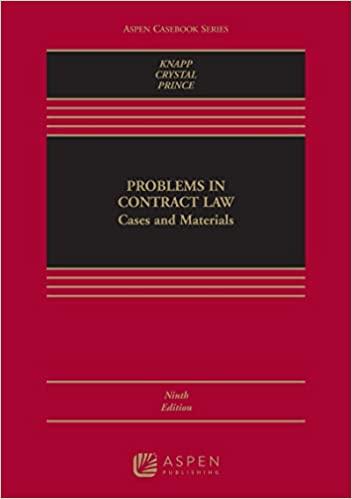Question
Title I of the Americans With Disabilities Act,42 U.S.C. 12112(a), requires employers to provide reasonable accommodation to otherwise qualified persons with a disability to enable
Title I of the Americans With Disabilities Act,42 U.S.C. 12112(a), requires employers to provide reasonable accommodation to otherwise qualified persons with a disability to enable them to work. The federal government has a similar requirement under Section 504 of the Rehabilitation Act of 1973, 29 U.S.C. 794. A "reasonable" accommodation a determination to be made on the facts by the employer on a case-by-case basis. Ultimately, the decision an employer makes could be reviewed by the Equal Employment Opportunity Commission (EEOC) (or an equivalent state agency) or a court if the employer's action is challenged by an applicant or employee.
PROMPT: CASE STUDY
Adele, a fully qualified specialized registered nurse, is deaf. She relies upon an American Sign Language (ASL) interpreter to communicate with hearing individuals in the workplace. Adele applied for a job with Marigold Mercy Receiving and Trauma Center ("MMRTC"), a large medical center that, with all its hubs and subsidiaries, grossed $1.3 billion annually. Adele received a job offer, conditioned upon a health screening and clearance by MMRTC's occupational health department. She was in fact cleared, but she notified MMRTC that she needed an ASL interpreter as an accommodation for her hearing impairment. The annual salary, including benefits, for her position was approximately $75,000. Upon investigation, MMRTC calculated that the annual cost to MMRTC for the ASL interpreter accommodation would be $120,000; there was the need for a full time interpreter for Adele, plus several situations where two ASL interpreters would be required. In considering Adele's request for accommodation, the hiring supervisor wrote in an email that the department's annual budget allocation could not absorb the "excessive cost of the additional personnel" of ASL qualified interpreters "for this one nurse." MMRTC determined the additional salary and overhead for the interpreters would be an "undue hardship," making the accommodation unreasonable. Therefore, MMRTC did not hire Adele. Did MMRTC violate ADA?
Step by Step Solution
There are 3 Steps involved in it
Step: 1

Get Instant Access to Expert-Tailored Solutions
See step-by-step solutions with expert insights and AI powered tools for academic success
Step: 2

Step: 3

Ace Your Homework with AI
Get the answers you need in no time with our AI-driven, step-by-step assistance
Get Started


